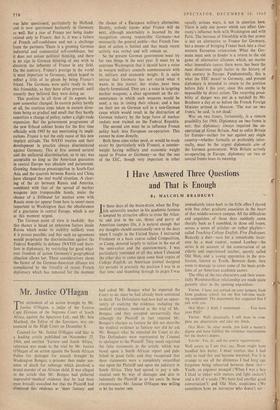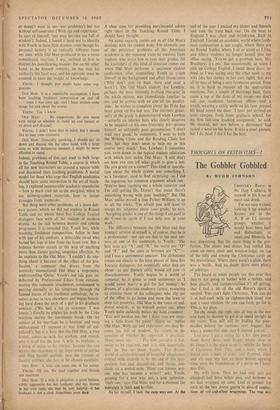I Have Answered Three Questions and That is Enough
By MALCOLM .BRADBURY
TN these days of the brain-drain, when the Eng- 'fish university teacher in his academic fastness is tempted by attractive offers to cross the Atlan- tic and join in the cut, thrust and parry of American campus life, it is natural enough that my thoughts should occasionally turn to the days when I taught in the United States. I instructed Freshmen in a basic course called Composition, or Comp, devoted largely to tuition in the use of the semi-colon and the question-mark. I was particularly reminded of all this when I chanced the other day to come upon some back copies of College English, an American journal designed for perscins in precisely the position I was in at that time; and thumbing through its pages I-was immediately taken back to the little office I shared with five other graduate associates in the heart of that middle-western campus. All the difficulties and anguishes of those days suddenly came sharply back as I stumbled, in those old issues, across a series of articles—or rather playlets— called Teaching College English: Five Dialogues. Basically a duet—save for a remarkable incur- sion by a mad student, named Lowboy—the series is an account of the conversation of an elderly and experienced teacher, sparely called Old Man, and a young apprentice in the pro- fession, known as Youth. Between them, they seem to manage to cover some of the basic prob- lems of an American academic career.
The roles of the two characters and their essen- tially Wordsworthian relationship are made quite patently dear in the opening exposition : YOUTH: I have just arrived on your 'campus, 'fresh from graduate school, for my first full-time teach- ing assignment. The department has suggested that talk with you.
OLD MAN: I think I understand. . . . You have your PhD?
YOUTH: Well, practically. I still have to com- plete my dissertation and take my finals.
OLD MAN: In other words, you hold a master's degree and have fulfilled the residence requirements
for the doctor's degree. .
YOUTH: Yes, sir, and the course requirements. Well aware as I am that, say, Ibsen might have handled this better, I must confess that I had only to read this and become involved. For it is strange to see all the dilemmas I had long ago forgotten being rehearsed between these two.- Youth, an engineer manqué ('When I was a boy I liked to tinker with motors and light sockets') and a bit of a toady ('We have had another good conversation'); and Old Man, suspicious ('We sometimes have an instructor who doesn't see-
or doesn't want to see—our problems') but not without self-assurance ('With age and experience,' he says of himself, 'one may become too full of wisdom'). Indeed, 1 found it hard not to identify with Youth in these little dramas. even though his personal history is so radically different from my own; while Old Man produced in me a more complicated reaction. I was inclined at first to distrust his pontificating manner, but on the other hand, as he himself remarks, he has won his authority the hard way, and his opinions must be counted to have the weight of knowledge:
YOUTH: I thought you might have some sug- gestions OLD MAN: It is a reasonable assumption. I have been teaching freshman composition on and off . . since I was your age, and I have written some things for and about the course.
Yount: Yes, I know.
OLD MAN: . . . By suggestions, do you mean such thingi as whether to stand up and lecture or sit down and discuss?
Yount: I didn't have that in mind, but I should like to hear your comment.
OLD MAN: Generally speaking, I should say sit down and discuss. On the other hand, with a large class or with inattentive students it might be more . effective to stand.
Indeed, problems of this sort used to bulk large in the Teaching Round Table, a course in which all the new instructors sat around a square table and discussed their teaching problems. A useful model for those who urge that English academics should have some instruction in the art of teach- ing, it explored innumerable academic quandaries —how to mark (red ink in the margins), when to use mimeographed materials, how to assign passages from textbooks.
But there were other problems, of a more deli- cate nature, which we did not explore in Round Table and yet which these five College English dialogues face with all the realism of modern drama. As the talk between mentor and ephebe progresses, it is revealed that Youth has, while teaching freshman composition, fallen in love with one of his students, a delectable co-ed who batted her legs at him from the front row. But a hideous barrier stands in the way of anything more than distant gazing, unspoken affection. As he explains to the Old Man: 'I couldn't do any- thing about it because of the ethics of the pro- fession,' a comment that draws from the normally unemotional Old Man a responsive, understanding 'Quite.' Youth's sad tale goes on; debarred by Professional Ethics from consum- mating this romantic attachment, condemned to peering eternally at his temptress through' the fanned leaves of his freshman anthology, he re- solves at last to turn elsewhere, and begins breath- ing hard down the neck of a girl in his graduate seminar. ('We had a lot in common. I was lonely.') Finally he plights his troth by the Coke machine during the ten-minute break. On the subject of his marriage he is hesitant and even embarrassed CI suppose it was kind of cal- culated'); but it is here that the Old Man, a true friend, comes in with his wisdom, and reveals why it is all for the best. A wife, he explains, is a thing of value to the teacher, because she can waylay the chairman of the department at parties and fling herself usefully into the turmoil of faculty politics; she has to be chosen carefully.
OLD MAN: A wife can assist one in his career.
YOUTH: Oh yes. We read together and discuss our reactions.
OLD MAN: If a wife is attractive, a good hostess, subtly aggressive for her husband, and has money in her own right, she may be very helpful—if her husband is not a clod. Sometimes even thei.
A clear case for' providing matrimonial advice right there in the Teaching Round Table, I should have thought.
An equal sagacity comes out in all Old Man's dealings with the student body. For example, one of the persistent problems of the American academic is the repeated visits he receives from students who invite him to raise their grades. All the knottiness of this kind of situation comes out when Old Man performs a specimen student conference, after counselling Youth to couch himself in the background and affect insouciance ('Why don't you sit back there and read a book?'). The Old Man's. student, Joe Lowboy, perhaps the most. intensely realised character in the whole oeuvre, was immediately familiar to me, and he arrives' with an aim all too predict- able: he wishes to complain about the D he has been given on his last test. The intrinsic gener- osity of the grade is demonstrated when Lowboy —actually an inferior bore who clearly deserves to be impaled on his own fraternity pin--proves himself an unhappily poor grammarian. 'I don't read very good,' he comments, 'I went to both the Writing Clinic and the Reading Clinic last year, but they don't seem to help me in this course very much.' Yes, Lowboy, I remember you, even down to the typical student relativism with which you tackle Old Man: 'I still don't see how you can tell what grade to give a test. Do you grade on a curve?' This kind of specula- tion about the whole system was something I,' as a foreigner, used to find surprising—as I did the ingenious but common argument which ran: 'You've been teaching me a whole semester and I'm still getting Ds. Doesn't that mean there's something wrong with your teaching?' But Old Man, unlike myself a true Father William, is up to all the tricks. 'I'm afraid you will have to accept my judgment about your grade,' he says, 'Assigning grades is one of the things I am paid to do. Come in again if I can help you in your work.'
The difference between the Old Man and that younger version of myself is, of course, that he is a professional—tone can see that in the neat apt- ness of one of his comments to Youth: 'The best tests are "A" and "B," the worst are "D" and "F," and the ones in between are "C" '— and I was a sentimental amateur. The dichotomy comes out clearly in the later phases of these five Socratic dialogues; for essentially what they are about—as any literary critic would tell you—is disenchantment. Youth begins in a world of romance; he is given to such sentiments as 'I would never marry a girl for her money'; he dreams of a glorious academic future, venturing to criticise those of his colleagues who slip out of the office to go home and mow the lawn or shop for groceries. Old Man is the voice of sad- dened wisdom, as he himself points out, when Youth quite suddenly makes the bold comment: 'You will pardon me, but I think you are stray- ing a little from the point.' Quite so,' replies Old Man, 'With age and experience one may be- come too full of wisdom. To return to the question of whether my approach is practical.
Many years apo. . . For him, paradise is lost, never to be regained, and it is this, essentially, that he has to teach Youth. The dream- world of scholarship and of beautiful affectionate contact with students is, by the end of this sym- posittm, lost and discredited, and things con- clude on a muted note. 'Have you known any- one who has become a writer?' asks Youth, groping for a new way out, a new optimism. 'Only one,' says Old Man; and for a moment the nostalgia. is thick and terrible. Ai fOr myself, I took the easy way. out. At the end of the year I packed my blazer and flannels and took the train back east. On the boat to England I was silent and withdrawn. Back- in England. I joined an academic world where fresh- man composition is not taught, where there are no Round Tables, where 1 sit or stand as I like, and where students no longer bound into my office saying,.'You've got a problem here, Mr. Bradbury; it's me.' But occasionally, as when I pick up College English, I recall those days; in- deed, as I was saying only the other week to my wife (she has money in her own right), that. was all by way of being a very formative period. Even so, it is hard to recover all the appropriate emotions. Just a couple of mornings back, there came a tap at the door of my room—we don't call our academic fastnesses offices—and a youth, wearing a sickly smile on his face, popped his head round the door. 'I have just arrived on your campus, fresh from graduate school, for my first full-time teaching assignment,' he said. He ducked, but not before a dictionary had raised a weal on his brow. It was a cruel gesture, but I do think I did it for the best.







































 Previous page
Previous page